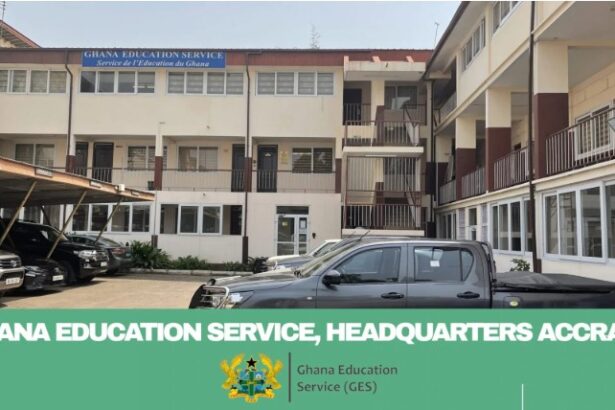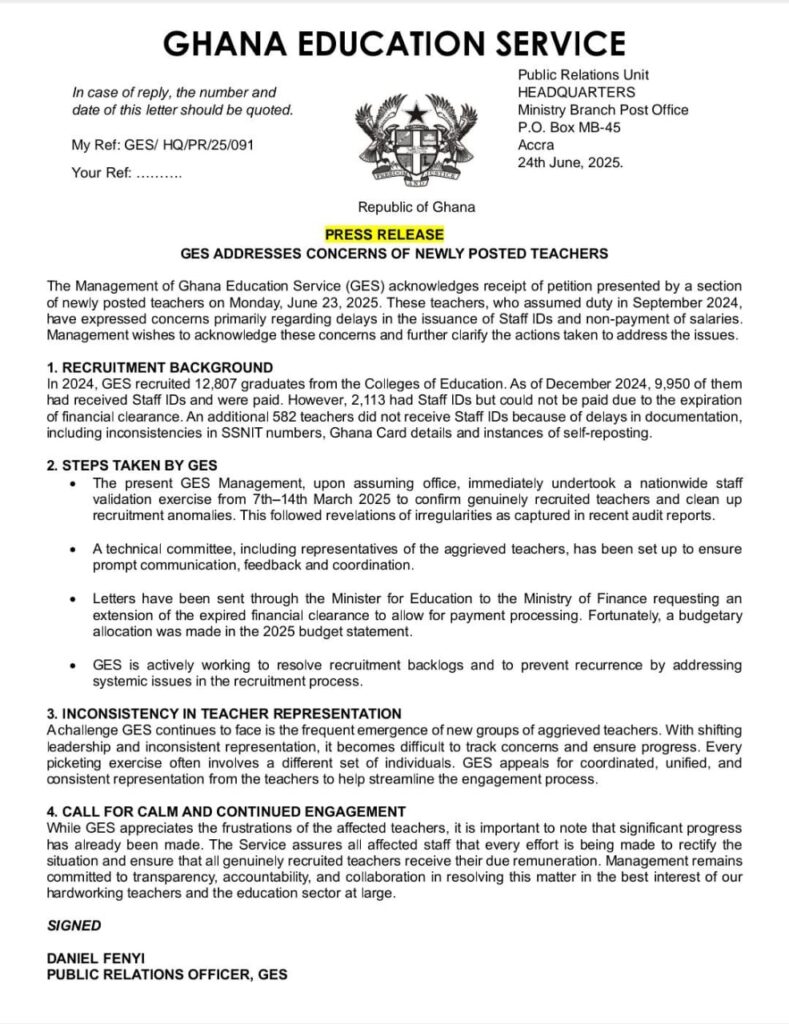
Budgetary allocations have been made to settle unpaid salaries GES has assured newly posted teachers who picketed its Accra headquarters on 23 June 2025. The Ghana Education Service (GES) responded swiftly after the demonstration by staff appointed in September 2024, who demanded payment of ten months’ arrears and issuance of staff identification cards.
Background to the Protest
Around 150 teachers gathered outside the GES head office early on Monday, holding placards and chanting slogans. They expressed frustration that, despite reporting for duty nearly ten months ago, they had yet to receive any salary. Many also lack official staff IDs, which they say has affected access to school premises, banking services and professional development programmes.
In its statement on 24 June, GES acknowledged the hardship caused by the delay. “We empathise deeply with the newly posted teachers,” GES Director-General Dr Kwame Opoku said. “Their welfare is a top priority and we are working urgently to address these issues.”
Cause of the Arrears
According to GES, the salary backlog resulted from an expired financial clearance inherited by the current management. That clearance, required for disbursing public sector wages, lapsed on 31 December 2024. Without it, the Controller and Accountant General’s Department could not process payroll for the affected cohort.
Since January, GES officials have held multiple meetings with the Ministry of Finance. These discussions secured provisional budget lines in the 2025 national budget presented to Parliament in March. The approved figures include a specific allocation to cover outstanding salaries for teachers who began work in late 2024.
Release of Funds
“In the 2025 budget, the Ministry of Finance set aside GH¢120 million for arrears,” GES explained. The sum is sufficient to clear the ten months owing to roughly 12 000 newly posted teachers. GES expects the Controller’s office to release funds within the next fortnight. Once the money arrives, salaries will be paid in full and back-dated allowances credited.
Joint Technical Committee
To ensure transparency, GES has formed a joint technical committee. The group comprises equal representation from GES management and five elected teachers from the affected cohort. Its mandate is to:
- Verify individual teaching records against the payroll database.
- Track disbursement of arrears once funds are received.
- Monitor issuance of staff ID cards through the National Identification Authority.
Committee members have already held two sittings and drafted a timeline for completing verification by mid-July. Teachers’ representatives say this joint approach will prevent errors and further delays.
Call for Unity Among Teachers
GES also appealed for coordinated representation. Over the past two weeks, several teacher associations and new informal groups have formed, each appointing its own leadership. GES cautioned that changing groups and demands complicates dialogue and slows progress. “Unified representation allows us to address concerns more effectively,” the statement read.
Broader Welfare and Career Progression
Beyond arrears, GES highlighted ongoing efforts to improve teacher welfare. Since taking office in 2024, management has:
- Promoted over 50 000 teaching and non-teaching staff to higher scales.
- Regularised long-overdue promotions for teachers waiting more than a decade for Deputy Director posts.
- Launched a national housing scheme offering low-interest mortgages to Ghanaian educators.
- Introduced continuous professional development workshops in all 16 regions.
These measures form part of a five-year strategic plan to raise morale, reduce turnover and attract high-calibre graduates into the profession.
What Happens Next
Once budgetary allocations are released, GES will notify headteachers to verify bank details and payroll records. The Controller’s office will then process lump-sum payments for each teacher’s arrears. Staff ID cards will be printed and dispatched to regional offices for collection by the end of July.
GES has set up a dedicated hotline and email channel for inquiries related to the arrears and ID issuance. Teachers are encouraged to use the joint technical committee where possible, and to avoid sending multiple reports to different GES units.

Conclusion
The resolution of these salary arrears is crucial to maintaining teacher motivation and the quality of education in Ghana. By securing budgetary allocations and engaging teachers directly, GES aims to restore confidence in public sector processes. All eyes now turn to the swift release of funds and the delivery of staff IDs, tasks that GES promises will be completed without further postponement.



